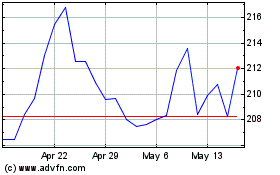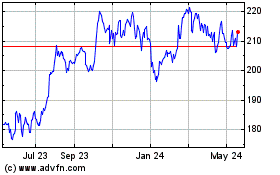Japanese Yen Strengthens, Erases May Losses
06 June 2016 - 4:00PM
Dow Jones News
HONG KONG—Asian currencies weakened in trading on Monday,
reversing some gains following Friday's U.S. jobs report that all
but wiped out expectations the U.S. Federal Reserve would raise
interest rates this month.
The yen weakened 0.5% to 107.089 against the U.S. dollar on
Monday. It reached its strongest level against the greenback in a
month late Friday, when the Japanese currency stood as strong as
106.35 against the U.S. dollar.
Friday's move erased all of the weakness the yen had seen during
May, when the currency fell 4.1% to 110.68 by the month's end—the
biggest one-month depreciation in a year-and-a-half. That helped
reversed some gains in the yen since the Bank of Japan introduced
negative interest rates at the end of January, a move that
convinced some in the market that monetary policy had reached its
limit.
Japan's Chief Cabinet Secretary Yoshihide Suga said Monday that
the government is "closely watching movements in the market with
careful attention," adding that sharp moves in currency markets
weren't desirable.
Elsewhere on Monday, the Chinese yuan appreciated to as much as
6.5518 against the U.S. dollar. The People's Bank of China
strengthened its yuan-fixing against the greenback by the most in
five weeks.
But analysts were thrown off by the fact that the yuan didn't
strengthen more in the wake of the dollar's selloff, prompting
speculation that China's central bank is again quietly weakening
its exchange rate.
Data released Friday showed the U.S. economy added just 38,000
jobs during May, far below the 158,000 expected by markets. That
produced a surge for Asian currencies as investors pushed out their
expectations of when the Federal Reserve will raise interest rates
to later in the summer, leaving the U.S. dollar weaker
accordingly.
Sue Trinh, head of Asia currency strategy at RBC Capital Markets
in Hong Kong, said the weaker payrolls number and weaker dollar had
boosted the yen the most, "given it's the most highly leveraged
currency to Federal Reserve rate hike expectations," she said.
Efforts by Japanese government officials to talk down the resurgent
yen would be closely watched in the lead-up to the Bank of Japan's
policy meeting ending June 16.
Also Monday, the Nikkei Stock Average sank as much as 1.9%
before recovering later in the trading session, as investors bet
that the stronger yen would weigh on the earnings of exporters. The
index was last down 0.7%, paring declines as the weaker yen lifted
stocks.
Chinese markets fluctuated between gains and losses in early
trading. In Hong Kong, the Hang Seng Index fell 0.2%, while the
Shanghai Composite was last flat.
For much of the past year, Beijing has stated that it would
allow market forces to play a greater role in determining its
exchange rate. However, considerable skepticism exists that policy
makers are doing as they say.
Zhou Hao, senior emerging markets economist for Asia at
Commerzbank, said the yuan should have been fixed stronger than
what the market rate had suggested -- one indicator that Chinese
policy makers are attempting to engineer weakness in the yuan.
"China is still trying to manage its currency and the exchange
rate," he said. "China doesn't want to lose control and follow the
market."
The yuan will likely trade in a broadly stable range for the
next few weeks as Federal Reserve expectations are repriced. "Right
now the renminbi isn't in focus; it's the U.S. that's in the
spotlight," Mr. Zhou added, using another name China's currency is
known by.
Following the U.S. nonfarm payrolls report, investors sharply
reduced bets that the Federal Reserve would raise rates during the
next two months. Fed fund futures priced in a 4% chance of a rate
increase in June, compared with a 20.6% probability before the
release of the employment figures, according to data from CME
Group. The market views July as more likely, but expectations of an
increase still fell from 58.4% to 31%.
Attention will turn Monday night in Asia hours to a speech by
Fed Chairwoman Janet Yellen at the World Affairs Council of
Philadelphia for signs of how the U.S. central bank views the
latest employment data.
Megumi Fujikawa in Tokyo contributed to this article.
(END) Dow Jones Newswires
June 06, 2016 01:45 ET (05:45 GMT)
Copyright (c) 2016 Dow Jones & Company, Inc.
CME (NASDAQ:CME)
Historical Stock Chart
From Jun 2024 to Jul 2024

CME (NASDAQ:CME)
Historical Stock Chart
From Jul 2023 to Jul 2024
